New funding furthers AI-driven public health projects in the Global South
November 15/2024
The Dalla Lana School of Public Health received $2.15 million to scale successful projects and make them sustainable.
By Ishani Nath

There were no hospitals in the small village where Assistant Professor Jude Kong of the Dalla Lana School of Public Health grew up in Cameroon. No local doctors. He remembers feeling neglected by the health-care system, resorting to home remedies due to lack of access to health information and professionals.
Now, as Director of the Africa-Canada Artificial Intelligence and Data Innovation Consortium and University of Toronto’s Artificial Intelligence and Mathematical Modelling Lab, Kong is working to harness the power of responsible artificial intelligence (AI) to improve public health in communities like the one he grew up in.
“Can I create proactive tools that would have saved my relatives that died from malaria when I was growing up? That’s what we’re looking for,” says Kong. In support of this search, the Dalla Lana School of Public Health recently received $2.15 million for a major research project led by Kong.
The “AI Solutions for One Health Approaches to Epidemic and Pandemic Prevention and Response” project is jointly funded by Canada’s International Development Research Centre (IDRC) and the United Kingdom’s Foreign Commonwealth and Development Office (FCDO). This project builds on the success of the IDRC-funded AI for Pandemic and Epidemic Preparedness Network (AI4PEP), seeded by Kong in 2022. AI4PEP benefits from the insights and efforts of more than 160 researchers with projects across Africa, Asia, Latin America, the Caribbean, the Middle East and North Africa.
AI4PEP spurred 15 responsible AI-driven health projects, including an app that improves polio detection in Ethiopia, a ChatBot called “Dominique” that helps identify fake news in Brazil, an air quality surveillance system called ‘AI_r’ in South Africa that pinpoints areas of concern and a cough monitor in Peru that enables users to screen for respiratory infections. Each project was put through a rigorous framework to ensure that the use of AI is ethical, safe, inclusive, rights based, green and reflective of Global South perspectives. This new IDRC-FCDO funding will further the growth of these projects and seed five additional projects strategically selected based on thematic, geographic and/or linguistic gaps in the network.
“We have AI solutions that we have created, and with this additional funding, we will be able to scale and sustain true, continuous collaborations with the communities we have been working with and the researchers across the Global South and the Dalla Lana School of Public Health, as well as policymakers and governments in 21 countries around the world,” says Kong.
With urbanization, globalization and climate change, disease outbreaks are becoming more frequent and severe. These initiatives offer proactive solutions by enhancing surveillance, diagnostics, education and public health outreach. As Kong puts it, these responsible AI solutions have the potential to detect the spread of disease before it ever happens.
“I always thought about my village growing up,” says Kong when asked about the potential impact of this project. “But I’m really happy that I’m able to do it now for the entire Global South working with our colleagues, thanks to IDRC and FCDO.”